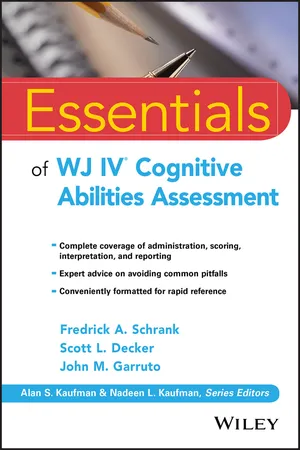
Essentials of WJ IV Cognitive Abilities Assessment
- English
- ePUB (mobile friendly)
- Available on iOS & Android
Essentials of WJ IV Cognitive Abilities Assessment
About this book
The step-by-step guide to administering, scoring, and interpreting the WJ IV ® Tests of Cognitive Abilities
Essentials of WJ IV ® Cognitive Abilities Assessment provides expert, practical advice on how to administer, score, and interpret the WJ IV COG ®. Designed to be an easy-to-use reference, the text goes beyond the information found in the WJ IV ® examiner's manual to offer full explanations of the tests and clusters on the WJ IV COG ®. This essential guide also explains the meaning of all scores and interpretive features and includes valuable advice on clinical applications and illuminating case studies.
This clearly written and easily accessible resource offers:
- Concise chapters with numerous callout boxes highlighting key concepts, numerous examples, and test questions that help you gauge and reinforce your grasp of the information covered.
- An in-depth chapter on interpretation of the WJ IV COG ® which highlights links to interventions for each test based on contemporary theory and research.
- Expert assessment of the tests' relative strengths and weaknesses.
- Illustrative case reports with clinical and school-based populations.
If you're a school psychologist, clinical psychologist, neuropsychologist, or any professional or graduate student looking to become familiar with the new WJ IV COG ®, this is the definitive resource you'll turn to again and again.
Frequently asked questions
- Essential is ideal for learners and professionals who enjoy exploring a wide range of subjects. Access the Essential Library with 800,000+ trusted titles and best-sellers across business, personal growth, and the humanities. Includes unlimited reading time and Standard Read Aloud voice.
- Complete: Perfect for advanced learners and researchers needing full, unrestricted access. Unlock 1.4M+ books across hundreds of subjects, including academic and specialized titles. The Complete Plan also includes advanced features like Premium Read Aloud and Research Assistant.
Please note we cannot support devices running on iOS 13 and Android 7 or earlier. Learn more about using the app.
Information
Chapter One
Overview
History and Development
1977: The Woodcock-Johnson Psycho-Educational Battery
Table of contents
- Cover
- Title Page
- Copyright
- Table of Contents
- Series Preface
- Dedication
- Acknowledgments
- Chapter One: Overview
- Chapter Two: How to Administer the WJ IV COG
- Chapter Three: How to Score the WJ IV COG
- Chapter Four: How to Interpret the WJ IV COG
- Chapter Five: Strengths and Weaknesses of the WJ IV COG
- Chapter Six: Illustrative Case Studies
- Chapter Seven: Illustrative Case Studies
- Appendix: The WJ IV Gf-Gc Composite and Its Use in the Identification of Specific Learning Disabilities
- References
- About the Authors
- About the Contributors
- Index
- End User License Agreement